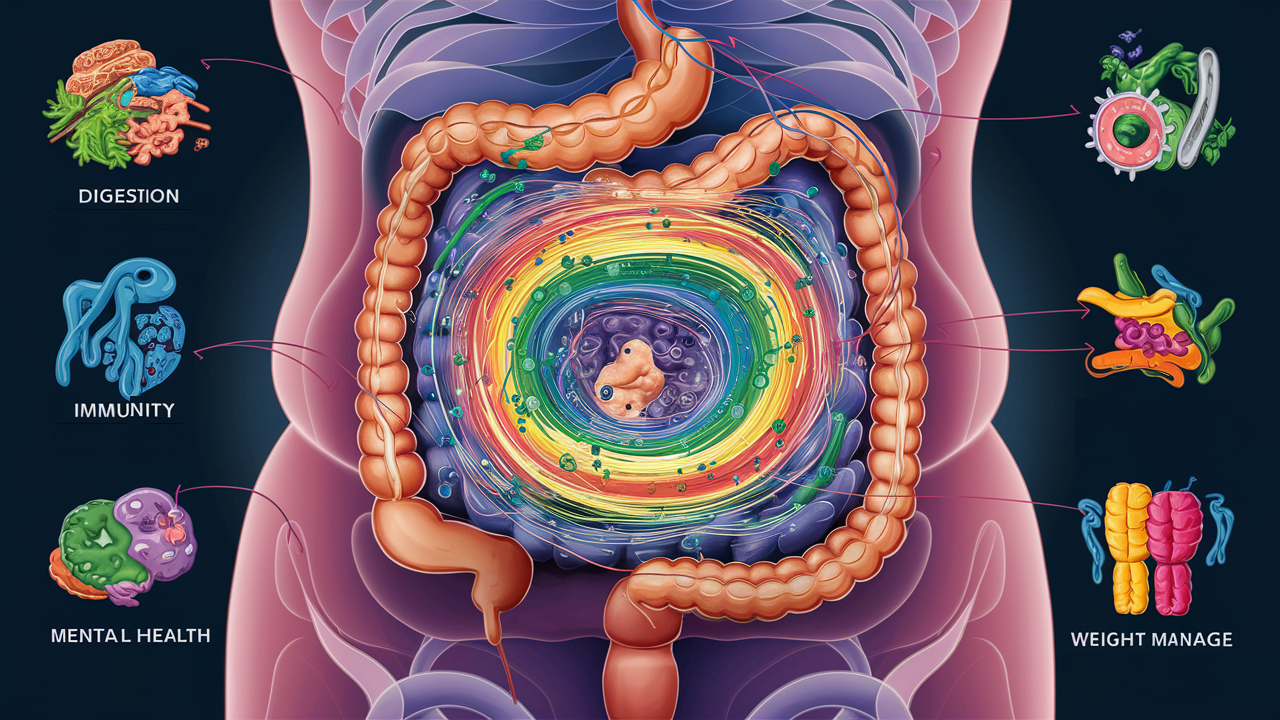As Ed Yong eloquently put it in his book I Contain Multitudes, "Every animal, whether human, squid, or wasp, is home to millions of bacteria and other microbes." This teeming world within us, known as the gut microbiome, is a complex and dynamic ecosystem that profoundly influences our health and well-being.
The Good, the Bad, and the Balance Gut
Our gut microbiome isn't just a random collection of microbes. It's a carefully balanced community where beneficial bacteria play a starring role. These "good" bacteria help us:
- Digest food: They break down complex carbohydrates, produce essential vitamins like B vitamins and vitamin K, and extract nutrients that we can't access on our own.
- Strengthen immunity: A significant portion of our immune system resides in the gut. Beneficial bacteria like Lactobacillus, found in fermented foods like yogurt, and Bifidobacterium, common in dairy, help train our immune cells to recognize and fight off harmful pathogens.
- Influence mood: The gut and brain are intricately connected through the gut-brain axis. Research suggests that gut bacteria like Streptococcus thermophilus, also found in yogurt, can influence neurotransmitter production, affecting mood, anxiety, and even cognitive function.
Of course, not all bacteria are beneficial. Some harmful bacteria, if left unchecked, can disrupt digestion, weaken immunity, and produce toxins that contribute to health problems. Examples include:
- Clostridium difficile: This bacterium can cause severe diarrhea and colitis, especially after antibiotic use.
- Salmonella: This bacteria is a common cause of food poisoning, leading to symptoms like diarrhea, fever, and abdominal cramps.
- Escherichia coli (E. coli): Certain strains of E. coli can cause severe foodborne illness.
The Power of Probiotics: Nurturing the Good Guys
Probiotics are live bacteria and yeasts that, when consumed in adequate amounts, offer a health benefit. They're like reinforcements for your gut's beneficial bacteria, helping to restore and maintain a healthy balance. Choosing the right probiotic is crucial. Look for labels that specify:
- Strain: Different strains of bacteria have different effects. Well-researched strains include Lactobacillus acidophilus, Lactobacillus rhamnosus, Bifidobacterium lactis, and others.
- CFUs: This stands for colony-forming units and indicates the number of live bacteria in each dose. Look for at least 1 billion CFUs for most effective probiotics.
- Storage and Expiration: Some probiotics need refrigeration. Check the label and expiration date to ensure potency.
Personalized Insights: The Role of Gut Microbiome Testing
Everyone's gut microbiome is unique. A gut microbiome test can provide a personalized snapshot of your gut bacteria composition, revealing imbalances or deficiencies that may be contributing to health concerns. This information can guide targeted interventions like personalized probiotic recommendations or dietary changes to optimize your gut health. Mapmygenome offers MapmyBiome as a simple at home test to decode your gut microbiome.
Nourishing Your Inner Ecosystem
Beyond probiotics, you can cultivate a healthy gut microbiome through:
- Diet: A fiber-rich diet with plenty of fruits, vegetables, and whole grains provides fuel for beneficial bacteria. Fermented foods like yogurt, sauerkraut, and kimchi are natural sources of probiotics.
- Lifestyle: Manage stress, get enough sleep, and avoid excessive antibiotic use, as these factors can disrupt the delicate balance of your gut microbiome.
The Gut Microbiome: Your Partner in Health
As Ed Yong reminds us, we are not alone. The trillions of microbes that call our gut home are essential partners in our health journey. By understanding and nurturing this intricate ecosystem through diet, lifestyle, probiotics, and personalized testing, we unlock the potential for improved digestion, stronger immunity, enhanced mood, and overall well-being.
Disclaimer: This blog post is intended for informational purposes only and is not a substitute for professional medical advice. Please consult with your healthcare provider before starting any new supplement regimen or undergoing any medical tests.















